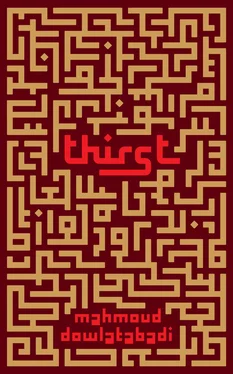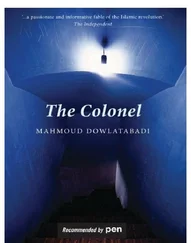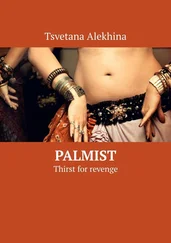‘Are you sure you’re in your right mind, Katib?’
‘Only the flies … the flies won’t let me. I can put up with the candle smoke and the smell of damp … and all manner of deprivation and discomfort … but these flies. The flies mating, the trench and the wounded captive and now this … this thought that has forced me to live in the past. Think in the past. The dwellers of the Gobi desert were under our control. Whenever necessary we dispatched them to ride in and topple the government in Khorasan and seize control of the throne. The Samanids! They were mindful of their distinguished heritage and proceeded to foster culture and produce scientists and translators and analysts. But because they started putting down roots, we destroyed them from within, so effectively that the last in line blinded his heir before going insane. As I’ve said, the Samanids harboured a nostalgia for old Iran and built a city of seven interlinked castles, in the manner of Ctesiphon. This displeased us, so we decided to set our proxy army of desert dwellers on them. Because the Samanid court had become a hotbed of petty quarrels and covert and overt animosities and internecine feuding, each faction raised a banner and a clerk and a commander and an army against Baghdad. It was during one such conflict that the desert-dwelling emirs rose up against their own king, meaning that they became heretics. The emirs’ uprising did not achieve its aim of killing the king and seizing the throne. But it did prompt the son of the Samanid ruler to usurp his father, who was arrested, imprisoned in an ancient castle and then murdered. At the same time, an order was issued to slaughter all those who were heretics, in their thousands … it must have been during that conflict that the poet laureate of the time was blinded, perhaps after a false accusation or on some other groundless pretext!’
‘Such as?’
‘For being too good-looking, reciting beautifully, or for the crime of playing instruments well … or even for seeing beautifully. For seeing beautifully, and for observing beauty. Do you know what we did to the women of Bukhara when we conquered the city? They were the most beautiful women of grand Khorasan! And do you know what we did to the people of Sistan? The victorious commander ordered the dead to be piled up and blankets spread over the heap, which was duly done. Then he ascended the hill of corpses step by step and stood on top in prayer. And it has been said that he had a clear voice and a tall frame, large teeth and a wide mouth … but a coppersmith’s son surfaced in response to that pile some time later and set out on a journey to Baghdad to assassinate the caliph of the period. A city which the Iranians themselves had had a hand in building — unlike Damascus, which was built by the Romans. And their treason against themselves has been a blessing to us from God, for all eternity.’
‘Soldier, where are we?’
‘We’re passing the prison camp, sir.’
‘Passing? Turn around and drive back to my office.’
‘Yes, sir.’
‘Stop here, soldier! Run ahead of us and prepare some coffee, so the katib and I can stroll along after you at our leisure and find it ready when we arrive. I want you to feel at home here, Katib. It’s safe here. We’re under the protection of the International Red Cross. As you see, we’ve run up its flag above that tower. So we can walk along unhurriedly and calmly, and you’ll have time to reflect and I will be able to focus my mind on my responsibilities and my work. Now, what were we talking about?’
‘We were ranging far and wide. From Sistan to Khorasan, from Khorasan to Rey, Sepahan, Ahwaz, and from Ahwaz to Baghdad and back again. We were discussing the downfall of Saman, the Samanid dynasty, the power and the wisdom of caliphs, the deployment of the men from the Gobi desert, and finally we talked about Baghdad and the empire of our caliphs, which was ultimately defeated by the Ajams with the help of the Turks, after some eight centuries.’
‘I actually meant our discussion from Thursday, after office hours. I didn’t want to interrupt your fine speech … but certainly, if there’s time I’d be interested in hearing those tales from you, in their historical order. So, before we come back to the topic in hand, please make a mental note that you have to tell me about two things. First, the treason of the Ajams, and second, the conquest of Sistan and the conqueror of Sistan and the rise of the coppersmith’s son … and then, those women of Bukhara and that poet laureate … and … ah … well, the whole lot, basically … but let’s go to my office now, drink the coffee the soldier has brewed for us, and talk turkey about what really happened. The murder of a prisoner at the hands of two fellow inmates, and a pamphlet left by the victim and the backgrounds of all those three, paying special attention to the time they spent together in prison. Please, after you!’
* Arabic, meaning ‘Good Morning, author!’
† Arabic, meaning ‘non-Arab’. Historically, the word was often used in a derogatory sense by Arabs to refer to foreigners who could not speak Arabic, much in the same way as the Greeks referred to other peoples as barbarians. The word Ajam, however, was especially used in reference to the Persians; indeed, the Arabs called Persia the ‘Country of Ajams’. In the text, the word Ajam is used to refer to Iranians, in this somewhat derogatory sense.
AND NOW … SOMEWHERE a finger presses a button, a hand flicks a switch, and from a gaping metal maw a monster is released, soaring up under the dome of a sky that is blue, or maybe leaden, or perhaps cloudy and a bit rainy. But where is it bound for, this monster that flies yet which has no wings? No one knew the answer to this for sure, not even the owner of that hand or finger. By contrast, there were many who became aware of its sudden descent, but they don’t exist anymore to tell the tale. The wide muzzle of that metal barrel still smells of hell. But you … my son, Jamoo! Now be attentive! Open your mouth, grip my finger with your tongue between your lips and suck! Quick, before this life-giving sustenance goes to waste. It must be a bit salty, but it will save you from being overcome by faintness. Suck well, suck my finger, boy, harder, use more force. Just like a hungry child drinking from his mother’s breast. Drink before you lose consciousness. Drink! I want you to come to your senses and convey a message for me. Drink, with all your might! Whatever’s left over, I’ll give to our captive. I don’t want him to die either. Keep your wits about you! After drinking you must send a message. And if you’re still dumb and dim and dense even after that, I’ll bring you back to your senses with a slap! And if all else fails, then I’ll expend a bullet on you even though I really don’t want you to die. Quite the opposite, I want you to live. You must live. You’re still too young to fade away. So … tell me now, do you feel any better? Can you transmit the message? Now, anta! Tashrab, tashrab! *See how eagerly he sucks, the rogue! Do you remember now? You couldn’t wait for the lioness to come and find you! She would have come. She will come still. But for the time being just obey the order. Dial the code for headquarters. Now! Say ‘Yes, sir’. Say ‘Yes, sir’, quick!
‘Yes … yes, commander!’
‘Good, brave boy. Now transmit!’
‘What’s the message, commander?’
‘A sea … a sea … the desert … is a sea! †Done?’
‘Yes … yes, sir, but …’
‘But this, but that …’
‘Should I transmit that too?’
‘No — of course not! Now tell me, how do you feel?’
‘Better, sir.’
‘All right, then, take out a piece of gauze, I mean a sterilized cloth, from the pocket of my backpack and bind my finger, not too tight. You can do it with your hand and teeth. Quick! I can’t take my eyes off the damned hills in front of us. Let me see what you’re doing. You can suck on it a bit more before binding it. Then I have some questions that you should be able to answer. Like what’s your name, where were you born, your parents’ names … I want you to be as alert as you were the first night. Quick!’
Читать дальше












